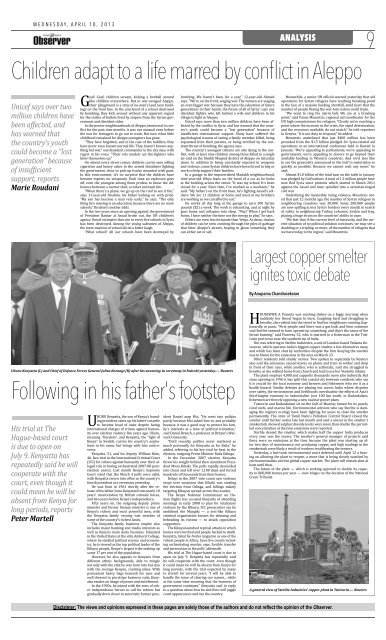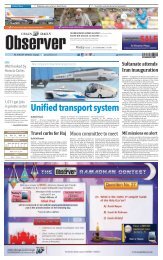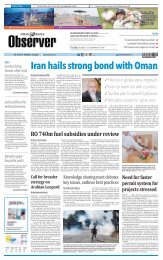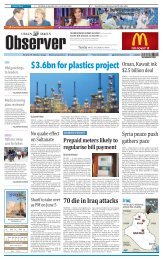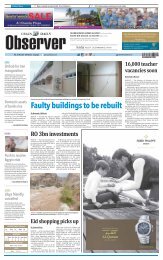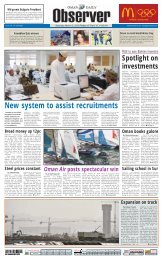Public warned of rising fraud - Oman Daily Observer
Public warned of rising fraud - Oman Daily Observer
Public warned of rising fraud - Oman Daily Observer
Create successful ePaper yourself
Turn your PDF publications into a flip-book with our unique Google optimized e-Paper software.
WEDNESDAY, APRIL 10, 2013<br />
ANALYSIS<br />
9<br />
Children adapt to a life marred by conflict in Aleppo<br />
Unicef says over two<br />
million children have<br />
been affected, and<br />
has <strong>warned</strong> that<br />
the country’s youth<br />
could become a “lost<br />
generation” because<br />
<strong>of</strong> insuficient<br />
support, reports<br />
Marie Roudani<br />
Goal! Goal! children scream, kicking a football around<br />
like children everywhere. But in war-ravaged Aleppo,<br />
their playground is a strip <strong>of</strong> no-man's land near buildings<br />
on the front line. In the courtyard <strong>of</strong> a school destroyed<br />
by bombing, they kick around without any apparent regard<br />
for the clatter <strong>of</strong> bullets ired by snipers from the Syrian government<br />
and dissident sides.<br />
In the poorer neighbourhoods <strong>of</strong> Aleppo, immersed in con-<br />
lict for the past nine months, it was not unusual even before<br />
the war for teenagers to go out to work. But now what little<br />
childhood remained for Aleppo youngsters has gone.<br />
"They have forgotten, and in the case <strong>of</strong> the toddlers, they<br />
have never even known normal life. They haven't known anything<br />
but war," one dissident commander in the city says, with<br />
regret in his voice. "Their role models are the ighters who<br />
blow themselves up."<br />
On almost every street corner, children can be seen selling<br />
cigarettes and honey cakes to the armed dissidents ighting<br />
the government, close to pick-up trucks mounted with guns.<br />
In this environment, it's no surprise that the children have<br />
become experts on weaponry. Each time an explosion goes<br />
<strong>of</strong>f, even the youngest among them pr<strong>of</strong>ess to know the difference<br />
between a mortar shell, a rocket and tank ire.<br />
"When there's a plane, we go up on the ro<strong>of</strong> to see it ire,"<br />
says 11-year-old Ibrahim, his father looking on with pride.<br />
"My son has become a man very early," he says. "The only<br />
thing he's missing is an education, because there are no more<br />
schools," Ibrahim's mother adds.<br />
In the two years since an up<strong>rising</strong> against the government<br />
<strong>of</strong> President Bashar al Assad broke out, the UN children's<br />
agency Unicef estimates that one in every ive schools in Syria<br />
has been destroyed. Among the young salesmen <strong>of</strong> Aleppo,<br />
the mere mention <strong>of</strong> school elicits a bitter laugh.<br />
"What school? All our schools have been destroyed by<br />
bombing. We haven't been for a year," 12-year-old Ahmed<br />
says. "We're on the front, waging war. The women are waging<br />
an even bigger war because they have the education <strong>of</strong> future<br />
generations in their hands, the future <strong>of</strong> all <strong>of</strong> Syria," says one<br />
dissident ighter, who left behind a wife and children in his<br />
village to ight in Aleppo.<br />
Unicef says more than two million children have been affected<br />
by the conlict in Syria, and has <strong>warned</strong> that the country's<br />
youth could become a "lost generation" because <strong>of</strong><br />
insuficient international support. Many have suffered the<br />
psychological trauma <strong>of</strong> seeing a family member killed, being<br />
separated from their parents, or being terriied by the constant<br />
threat <strong>of</strong> bombing, the agency says.<br />
The country's youngest citizens are also dying in the con-<br />
lict, with at least nine children among those killed in a single<br />
air raid on the Sheikh Maqsud district <strong>of</strong> Aleppo on Saturday<br />
alone. In addition to being constantly exposed to weapons<br />
and violence, some Syrian children have been forced to beg or<br />
work to help support their families.<br />
In a garage in the impoverished Maslakh neighbourhood,<br />
nine-year-old Yehya leans on the hood <strong>of</strong> a car as he looks<br />
at the building across the street. "It was my school. It's been<br />
closed for a year. Since then, I've worked as a mechanic," he<br />
said. "My father's on the front lines, he's ighting Assad's soldiers.<br />
We are 11 children at home and most <strong>of</strong> my brothers<br />
are working so we can afford to eat."<br />
He works all day long at the garage to earn 200 Syrian<br />
pounds ($2) a week. The work is exhausting, and at night he<br />
goes home and collapses into sleep. "Play? When I get back<br />
home, I have neither the time nor the energy to play," he says.<br />
Others are even less fortunate than Yehya. At dawn, dozens<br />
<strong>of</strong> children can be seen combing through the piles <strong>of</strong> garbage<br />
that litter Aleppo's streets, hoping to glean something they<br />
can either eat or sell.<br />
Meanwhile, a senior UN <strong>of</strong>icial <strong>warned</strong> yesterday that aid<br />
operations for Syrian refugees have reaching breaking point<br />
in the face <strong>of</strong> a massive funding shortfall, amid fears that the<br />
number <strong>of</strong> people leeing the war-torn nation could triple.<br />
“We want to ring the alarm bell. We are at a breaking<br />
point,” said Panos Moumtzis, regional aid coordinator for the<br />
UN high commissioner for refugees. “Clearly we’re reaching a<br />
point where the increase in the crisis, the rapid deterioration,<br />
and the resources available, do not match,” he told reporters<br />
in Geneva. “It is our duty to respond,” he added.<br />
Moumtzis underlined that just $400 million has been<br />
provided from the $1.5 billion pledged for Syria-related aid<br />
operations at an international conference held in Kuwait in<br />
January. “We’re appealing to parliaments, we’re appealing to<br />
governments, we’re appealing to donors to go beyond their<br />
available funding in Western countries. And we’d also like<br />
to see the generosity announced in the Gulf to materialise as<br />
quickly as possible. Because we cannot wait any more,” he<br />
said.<br />
Almost $1.0 billion <strong>of</strong> the total sum on the table in January<br />
was pledged by Gulf nations. A total <strong>of</strong> 1.3 million people have<br />
now led Syria since protests which started in March 2011<br />
against the Assad and have spiralled into a sectarian-tinged<br />
civil war.<br />
Underlining the inexorably <strong>rising</strong> violence, Moumtzis noted<br />
that just 12 months ago, the number <strong>of</strong> Syrian refugees in<br />
neighbouring countries was 30,000. Some 200,000 people<br />
are now spilling across Syria’s borders every month in search<br />
<strong>of</strong> safety in neighbouring Turkey, Lebanon, Jordan and Iraq,<br />
placing a huge strain on the countries’ ability to cope.<br />
“We fear that if the current level <strong>of</strong> insecurity, and the current<br />
situation <strong>of</strong> no political solution continues, we may see a<br />
doubling or a tripling, or more, <strong>of</strong> the number <strong>of</strong> refugees that<br />
we have today in the region,” said Moumtzis.<br />
Largest copper smelter<br />
ignites toxic debate<br />
By Anupama Chandrasekaran<br />
Uhuru Kenyatta (L) and Chief <strong>of</strong> Defence Forces General Julius Karangi (R) after his swearing-in ceremony in Nairobi yesterday.— Reuters<br />
Following in his father's footstep<br />
His trial at The<br />
Hague-based court<br />
is due to open on<br />
July 9. Kenyatta has<br />
repeatedly said he will<br />
cooperate with the<br />
court, even though it<br />
could mean he will be<br />
absent from Kenya for<br />
long periods, reports<br />
Peter Martell<br />
UHURU Kenyatta, the son <strong>of</strong> Kenya's founding<br />
president, takes up his father's mantle<br />
to become head <strong>of</strong> state despite facing<br />
international charges <strong>of</strong> crimes against humanity<br />
over election violence ive years ago. Uhuru,<br />
meaning "freedom", and Kenyatta, the "light <strong>of</strong><br />
Kenya" in Swahili, carries his country's aspirations<br />
in his name, but brings with him controversy.<br />
Kenyatta, 51, and his deputy William Ruto,<br />
46, face trial in the International Criminal Court<br />
(ICC) for crimes against humanity over their alleged<br />
role in having orchestrated 2007-08 postelection<br />
unrest. Last month Kenya's Supreme<br />
Court ruled that the March 4 polls were valid,<br />
with Kenyatta sworn into <strong>of</strong>ice as the country's<br />
fourth president at a ceremony yesterday.<br />
He was born in 1961 shortly after the release<br />
<strong>of</strong> his father Jomo Kenyatta from nearly 10<br />
years' incarceration by British colonial forces,<br />
and two years before Kenya's independence.<br />
Fifty years on, the outgoing deputy prime<br />
minister and former inance minister is one <strong>of</strong><br />
Kenya's richest and most powerful men, with<br />
the Kenyatta family owning vast swathes <strong>of</strong><br />
some <strong>of</strong> the country's richest lands.<br />
The Kenyatta family business empire also<br />
includes major banking and media interests as<br />
well as Kenya's main dairy business. Educated<br />
in the United States at the elite Amherst College,<br />
where he studied political science and economics,<br />
he is viewed as the top political leader <strong>of</strong> the<br />
Kikuyu people, Kenya's largest tribe making up<br />
some 17 per cent <strong>of</strong> the population.<br />
However, he also appeals to Kenyans from<br />
different ethnic backgrounds, able to mingle<br />
not only with the elite he was born into but also<br />
with the average Kenyan, cracking jokes. With<br />
permanent heavy bags beneath his eyes and<br />
well dressed in pin-stripe business suits, Kenyatta<br />
exudes an image <strong>of</strong> power and entitlement.<br />
In the 1990s, he joined with the sons <strong>of</strong> other<br />
independence heroes to call for reform but<br />
gradually drew closer to autocratic former president<br />
Daniel arap Moi. "He went into politics<br />
partly because Moi asked him to, and probably<br />
because it was a good way to protect his family's<br />
interests at a time <strong>of</strong> political transition,"<br />
said Daniel Branch, a pr<strong>of</strong>essor at Britain's Warwick<br />
University.<br />
"Until recently, politics never mattered as<br />
much personally for Kenyatta as for Raila," he<br />
added, referring to his key rival he beat in the<br />
election, outgoing Prime Minister Raila Odinga.<br />
In the December 2007 election Kenyatta<br />
threw his weight behind then incumbent President<br />
Mwai Kibaki. The polls rapidly descended<br />
into chaos and left over 1,100 dead and forced<br />
hundreds <strong>of</strong> thousands from their homes.<br />
Delays in the 2007 vote count saw violence<br />
erupt over suspicion that Kibaki was stealing<br />
the election from Odinga, and killings mainly<br />
targeting Kikuyus spread across the country.<br />
The Kenya National Commission on Human<br />
Rights has accused Kenyatta <strong>of</strong> attending<br />
meetings in early 2008 to plan for retaliatory<br />
violence by the Kikuyu. ICC prosecutors say he<br />
mobilised the Mungiki — a sect-like Kikuyu<br />
criminal organisation known for skinning and<br />
beheading its victims — to attack opposition<br />
supporters.<br />
The Kikuyu launched reprisal attacks in which<br />
homes were torched and people hacked to death.<br />
Kenyatta, listed by Forbes magazine as one <strong>of</strong> the<br />
richest people in Africa, faces ive counts including<br />
orchestrating murder, rape, forcible transfer<br />
and persecution in the polls' aftermath.<br />
His trial at The Hague-based court is due to<br />
open on July 9. Kenyatta has repeatedly said<br />
he will cooperate with the court, even though<br />
it could mean he will be absent from Kenya for<br />
long periods, with the trial expected by many<br />
to stretch for several years. "I will be able to<br />
handle the issue <strong>of</strong> clearing our names... while<br />
at the same time ensuring that the business <strong>of</strong><br />
government continues," Kenyatta said in reply<br />
to a question about how he and Ruto will juggle<br />
court appearances and run the country.<br />
HOUSEWIFE A Puneeta was washing dishes on a foggy morning when<br />
suddenly her throat began to burn. Coughing hard and struggling to<br />
breathe, she rushed into the street to ind her neighbours running, haphazardly,<br />
in panic. "First people said there was a gas leak, and then someone<br />
said Sterlite seemed to have opened up something, and that's the cause <strong>of</strong> the<br />
throat burning," said Puneeta, 32, who is married to a isherman in the Tuticorin<br />
port town near the southern tip <strong>of</strong> India.<br />
She was referring to Sterlite Industries, a unit <strong>of</strong> London-based Vedanta Resources,<br />
which operates India's biggest copper smelter a few kilometres away,<br />
and which has been shut by authorities despite the irm denying the smelter<br />
was to blame for the emissions in the area on March 23.<br />
Other residents told similar stories. Two spoken to separately by Reuters<br />
also said the emissions caused leaves on plants and trees to wither and drop<br />
in front <strong>of</strong> their eyes, while another, who is asthmatic, said she struggled to<br />
breathe as she walked home from church and had to use her Ventolin inhaler.<br />
The plant employs 4,000 and supports thousands more jobs indirectly. But<br />
since opening in 1996 it has split this coastal city between residents who say<br />
it is crucial for the local economy and farmers and ishermen who see it as a<br />
health hazard. Similar debates are playing out across India where disputes<br />
over safety, the environment and livelihoods overshadow the efforts <strong>of</strong> Asia's<br />
third-largest economy to industrialise. Just 100 km south, in Kudankulam,<br />
ishermen are iercely opposing a new nuclear power plant.<br />
Tuticorin and Kudankulam sit on the Gulf <strong>of</strong> Munnar, famed for its pearls,<br />
coral reefs, and marine life. Environmental activists who say Sterlite is damaging<br />
the region's ecology have been ighting for years to close the smelter<br />
permanently. The state <strong>of</strong> Tamil Nadu's Pollution Control Board closed the<br />
smelter until further notice late last month and said a sensor in the smelter's<br />
smokestack showed sulphur dioxide levels were more than double the permitted<br />
concentration at the time emissions were reported.<br />
Sterlite denied the smelter, which makes half the copper India produces<br />
every year, was the source. The smelter's general manager <strong>of</strong> projects said<br />
there were no emissions at the time because the plant was starting up after<br />
two days <strong>of</strong> maintenance, not producing copper, and high readings in the<br />
smokestack were likely a result <strong>of</strong> workers recalibrating the sensors.<br />
Yesterday, a fast-track environmental court deferred until April 12 a hearing<br />
on allowing the plant to reopen, a move that is being closely watched by<br />
environmentalists and the global copper market. The plant will remain shut at<br />
least until then.<br />
The future <strong>of</strong> the plant — which is seeking approval to double its capacity<br />
to 800,000 tonnes per year — now hinges on the decision <strong>of</strong> the National<br />
Green Tribunal.<br />
A general view <strong>of</strong> Sterlite Industries’ copper plant in Tuticorin.— Reuters<br />
Disclaimer: The views and opinions expressed in these pages are solely those <strong>of</strong> the authors and do not reflect the opinion <strong>of</strong> the <strong>Observer</strong>.


